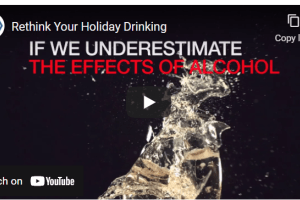
The older adult population is increasing rapidly. Alcohol use among older adults is also increasing. As we focus on the quality of life for this growing population, it’s important to take into account how alcohol affects their overall health.
Did you know that language commonly used to describe alcohol misuse and alcohol use disorder (AUD) can influence treatment outcomes in people suffering from alcohol problems? Yes, that can often be the case. In fact, the stigma perpetuated by such language can decrease a person’s motivation to seek help for an alcohol problem
Happy Saint Patrick’s Day! Because drinking alcohol is a large part of the St. Patrick’s Day festivities for many people, this is a good time to be mindful of how alcohol can impact your celebrations and your health.
The holidays are a time for celebration and alcohol is often present at festive gatherings. Despite all good plans, people may consume alcohol more than they intended.
We can help alleviate the stigma associated with alcohol-related conditions by consistently using non-pejorative, non-stigmatizing, person-first language to describe these concerns and the people who are affected by them. Keep in mind that some words that are commonly used in society, such as “alcoholic” and “alcohol abuse,” can be stigmatizing.
We are profoundly saddened at the passing of Dr. Mary Jeanne Kreek last week, at age 84.
It’s always a good idea to periodically examine your relationship with alcohol. A popular way to do this is to participate in a sober month like Dry January or Sober October, which are health and wellness trends that emphasizes taking a break from alcohol for an entire month.
Events such as Dry January and Sober October, as well as the broader sober curious movement, are rapidly gaining popularity, especially among Millennials.
The holiday season is here, bringing with it many opportunities for parties, celebrations, and for some – overindulging. So, it’s a good time to understand a little more about the possible consequences of these festivities, particularly the dreaded hangover.
September is a significant month for the alcohol field for two reasons: it’s the month dedicated to raising awareness about fetal alcohol spectrum disorders (FASD) and to celebrating recovery from alcohol and other substance use disorders.











